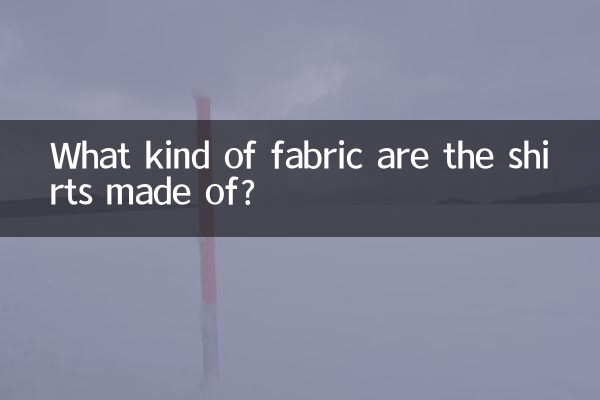What kind of fabric are the shirts made of?
Shirts are an essential item for daily wear, and the choice of fabric directly affects comfort, durability and overall style. In recent years, as consumers' requirements for clothing quality have increased, the types of shirt fabrics have become more diverse. This article will combine the hot topics and hot content on the Internet in the past 10 days to analyze the common fabric types and characteristics of shirts for you, helping you make more informed choices when purchasing.
1. Common types of shirt fabrics

Shirt fabrics are mainly divided into two categories: natural fibers and synthetic fibers. Each fabric has its own unique advantages and disadvantages. The following are common shirt fabrics on the market and their characteristics:
| fabric type | Features | Applicable scenarios |
|---|---|---|
| pure cotton | Good breathability, strong hygroscopicity, soft and comfortable, but easy to wrinkle | Daily wear, business casual |
| flax | Naturally breathable, moisture-absorbing and quick-drying, rough texture, easy to wrinkle | Summer casual, vacation style |
| silk | It has strong gloss, softness and smoothness, and good breathability, but it is expensive and difficult to take care of. | High-end business and dinner occasions |
| Polyester (polyester fiber) | Wear-resistant, wrinkle-resistant, easy to clean, but poor breathability | Sports shirts, fast fashion brands |
| Blended (cotton + polyester) | Combines the comfort of cotton with the durability of polyester with excellent wrinkle resistance | Business formal wear, daily commuting |
2. Analysis of popular fabric trends
Based on recent internet searches and social media discussions, the following shirt fabrics have become hot topics for consumers:
1.organic cotton: As environmental awareness increases, organic cotton is sought after for its pesticide-free residue and sustainability, especially among young consumers.
2.Lyocell: A new type of environmentally friendly fabric that combines the comfort of cotton with the luster of silk. It is easy to care for and has good breathability. It has become the new favorite of high-end shirts.
3.bamboo fiber: Naturally antibacterial, moisture-wicking and suitable for summer wear. Sales on e-commerce platforms have increased significantly recently.
4.functional fabrics: Technical fabrics such as UV protection, quick-drying, and anti-wrinkle are especially popular among outdoor sports enthusiasts and business people.
3. How to choose shirt fabric according to your needs?
1.business occasion: Prefer pure cotton or high-count cotton blended fabrics, which are fine and crisp, suitable for matching suits.
2.summer leisure: Linen or bamboo fiber shirts are breathable and suitable for hot weather, but you have to accept their natural wrinkles.
3.High-end occasions: Silk or Tencel fabric can enhance the overall texture, suitable for dinner parties or important meetings.
4.daily commute: Blended fabric is wrinkle-resistant and easy to care for, saving time and keeping tidy.
4. Maintenance tips for shirt fabrics
Shirts of different fabrics require different care:
| fabric type | Cleaning recommendations | Ironing temperature |
|---|---|---|
| pure cotton | Machine wash or hand wash, avoid high temperature tumble drying | Medium to high temperature (around 150°C) |
| flax | Recommend hand washing and lay flat to dry | High temperature (above 200°C) |
| silk | Dry clean or hand wash in cold water, do not wring out | Low temperature (below 110°C) |
| polyester | Machine washable, quick dry | Low temperature (below 130°C) |
Conclusion
The choice of shirt fabric is not only about comfort, but also reflects personal taste and lifestyle. Through the structured analysis of this article, I believe you can have a clearer understanding of the characteristics of various fabrics and make the best choice based on actual needs. Whether you pursue natural and environmentally friendly organic cotton or prefer high-tech functional fabrics, there is always one that suits you!

check the details

check the details